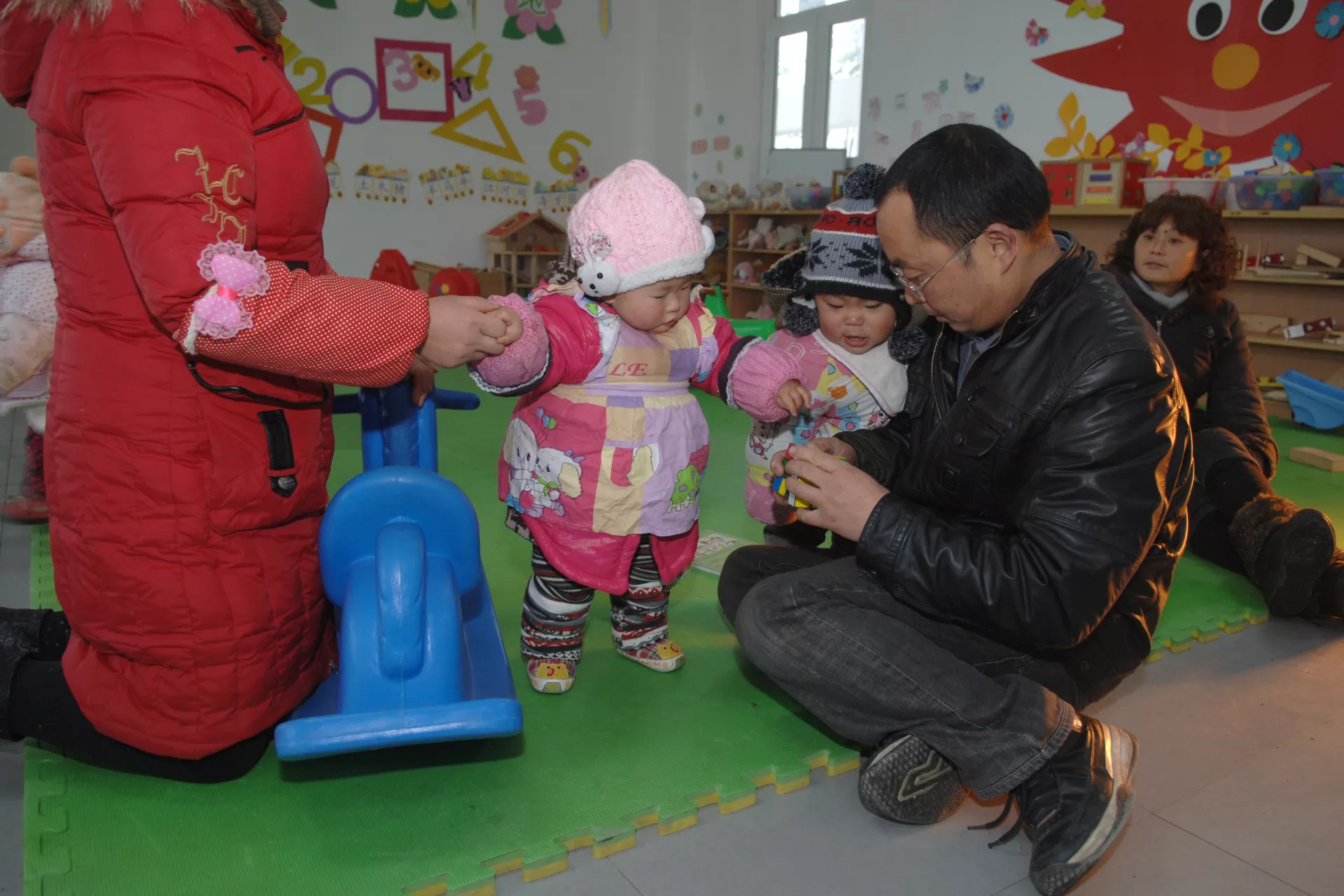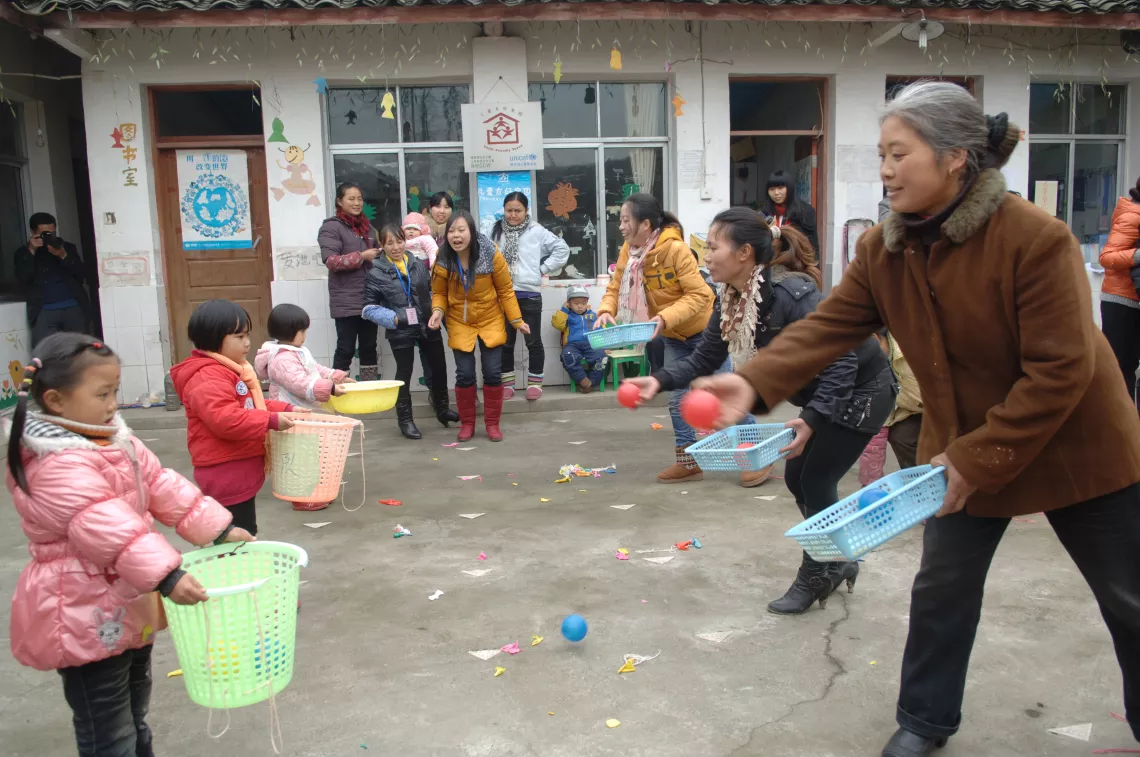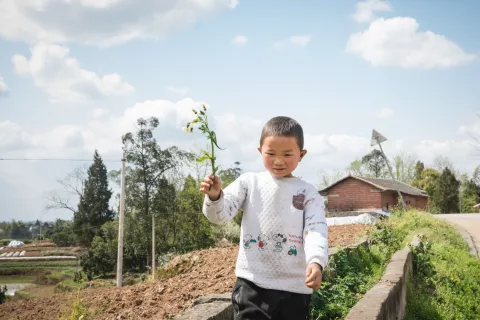Listening to children's voices
Listening to children's voices

- Available in:
- 中文
- English
Enveloped by mountains and valleys, Hongbai town of Shifang City, was among the most severely damaged in the Wenchuan Earthquake in southwest China in 2008. Out of the 6,800 inhabitants in 1,244 households, nearly 1,000 died, including 159 children under the age of 18.
Feng Fubin, a snack bar owner in Hongai, lost her daughter Liu Cailing. The girl was set to attend senior high school thanks to good performances in her studies.
In Hongbai, about 60 couples have had a second child after losing their first in the quake. Feng and her husband, Liu, a peddler in the open market, are among them.
Their son was born in August of 2009, and named Hanlin, "merited scholar" in Chinese. The name carries a partial tone of his sister's name in remembrance. However, Hanlin was born with a severe cleft lip and palate. He became a target for gossip in the temporary settlement camps, which brought immense social pressure on the family.
"I didn't dare bring Hanlin out to the street," says Feng, wiping away her tears.
Even more worse was that Hanlin had an eating problem because of his disability. The infant cried for food all night, resulting in continuous family conflicts. "I was grasped by grief and desperation," Feng says. A medical operation was the only solution, but that was financially impossible for the couple in their early forties.
She turned to Child Friendly Space (CFS), an initiative of the United Nations Children's Fund (UNICEF) and the Office of the National Working Committee on Children and Women under the State Council of China. It was established in the wake of earthquake as a place for children to play with toys, pianos and sports for free. It has become a community-based center dedicated to children's development, protection and participation. In doing so, CFS has dramatically challenged conventionally held notions about how to bring up children.
CFS enabled Feng to get the crucial operation for her newborn baby at no charge. This meant a rebirth for a family living in the shadows of sorrow.
Feng is one of many parents and caregivers in the town to have been helped by CFS. Across Sichuan, 40 CFS facilities have reached out to households in 21 cities and counties. CFS has become a platform enabling the young, aged, and females to participate in community affairs and culture in ways that would otherwise be impossible as China experiences a fast pace of urbanization.

Lian Shengqiong, a volunteer working for the organization, has visited about 40 families having a second child. "We should pay more attention to disabled children rather than laugh at their pitiable status. We should be careful not to create a sense of isolation for them," she says.
Before the quake, Lian had a small business with a decent income. But she was determined to help those in need by working as a volunteer at the local gas station during a busy time for the transportation of relief materials into Sichuan. Then, she applied to work voluntarily at CFS when it started to recruit members in September 2008. It was the first time such a community-based and child-focused model was introduced by UNICEF to China to meet the needs of children overwhelmed by catastrophic events.
Lian, a mother of a son aged 18, had her eyes opened by over 15 training workshops, teaching about the principles and practices of social work, preschool education and the development, protection and participation of children. One of the fresh concepts was a Children's Forum on Child Protection to facilitate children's free expression on issues like divorce and domestic violence.
At first, Lian was daunted by these "demanding tasks" and hesitant about whether to go on. Soon, these ideas about putting "children first" really began to appeal to her.
"In the past, I thought that it was enough to sufficiently feed and clothe one's children, and the authority of parents stands infallible. Now, I believe it is more important to communicate with them to give them more decision-making options," Lian says. She came to understand that CFS is an important community linking families and schools, serving as a catalyst for raising awareness of community-based protection for children.
By the time Hanlin was born, CFS in Hongbai town had evolved from a safe place in a post-emergency setting to an integral part of the child protection network, one linking sectors including public security, medical care, schools and civil affairs.
For the benefit of pregnant women in Hongbai, Lian helped organize a series of medical care-related lectures by pulling in volunteer speakers from such groups as the West China School of Medicine and the Youth Foundation of Hong Kong, the second of which coordinated a doctor for Hanlin's treatment in April 2010. The operation lasting 10 hours achieved its desired effect.
Since then, Lian has encouraged Feng to bring Hanlin to play with other kids at CFS, where he has learnt to crawl and speak. "I no longer fear any prejudice against my son. I believe he will develop as healthily as others," Feng smiles, embracing Hanlin in her arms.
Over the past three years, CFS in Hongbai town has become a magnet for both children and adults, as it provides services hardly accessible to those in remote villages.
Cheng Xingfu and Gan Shangmin of Ganjiawozi village often take their two-year-old daughter, Chen Jiayi, to CFS for the day. There are virtually no facilities or educational institutions catering to kids in their village atop a mountain which peaks at 1,100 meters above sea level.
"Compared with other children of her age, Jiayi is more vocal and active," says her father. This confidence, he believes, comes from the CFS activities that the little girl has been involved in.
Many of these are planned by the center's Children's Management Committee, a group composed of seven higher-grade students which is given a say in large-scale activities. Last summer, they proposed a trip to collect wild vegetables in the mountains, and putting on a fashion show involving recycled waste materials. These activities were well received by children like Jiayi.
"Different from a kindergarten where children are planted in a fixed environment, we tend to encourage the children to release their potential as they wish," says Liu Qing, another volunteer at the Hongbai-based CFS, where she is in charge of helping children with painting and handiwork.
"What the children propose is a real world of their own, reflecting their psychological inner space. The teachers and parents are not necessarily right in assessing the needs of children all the time," she says, greeting kids who amiably call her "auntie".
Over the past three years, the 40 CFS branches have served about 300,000 children and parents in Sichuan. 36 of the spaces are now financially supported by the local governments. The Mianyang municipal government has combined the 12 CFS centers under its supervision with "township culture stations" under construction to secure sustainable development, particularly for vulnerable children, senior citizens and women.
The success of CFS has translated into a substantial impact on the policy-making process. By 2020, 90 percent of communities in urban and rural regions in China will have at least one CFS branch, according to the National Program of Action for Child Development in China (2011-2020). The ultimate function of such a public space will be to coordinate services covering child protection, non-formal education, games, health and psycosocial support for children and families.
Yang Yuchuan, a social work professor at China Youth University of Political Sciences, commends CFS as an important component of civil society and an aid to China moving forward. In particular, she says, it successfully brings about fresh ideas while integrating local culture. "CFS paves the way for the development of plural systems for the protection of children in China," she says.
Challenges remain to be tackled. Yang Haiyu, a UNICEF child protection expert, says a shortage of skilled social workers and well developed referral systems means CFS has yet to become equipped in dealing with such issues as domestic abuse or seriously psychologically troubled children.




